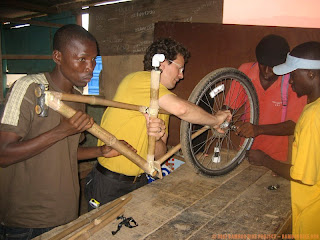 I think this is a fantastic idea! We all know the benefits of bamboo – strong, quick growing, highly versatile and we probably have all seen the wide variety of products that can be made from it. However, this is one product even on my Biome sourcing I have never seen...!
I think this is a fantastic idea! We all know the benefits of bamboo – strong, quick growing, highly versatile and we probably have all seen the wide variety of products that can be made from it. However, this is one product even on my Biome sourcing I have never seen...!The bamboo bicycle has been designed by Craig Calfee, the man behind Santa Cruz-based bicycle shop, Calfee Design.
I believe it is this type of innovative thinking that will help shift is from over-consuming resources to using materials which are renewable and plentiful.
Craig Calfee built his first bamboo bike a few years ago – however, with all great designs the original needed work, in fact the first bike was too flexible and prone to splitting so Craig admits, "That first bike was kind of scary to ride!".
However, the bike attracted a lot of attention and he began building bamboo bikes for friends, relatives and employees, and the popularity and demand grew among both everyday riders and even racers... he knew he was onto something special.
Following a visit Craig made to Africa almost 25 years ago, Craig remembered three things: 1. There was a lot of bamboo, 2. People used bikes and didn't have enough of them, and 3. They needed jobs.
If these bamboo bikes were such a hit in Santa Cruz, maybe people in needy African communities and villages could build their own bikes to carry cargo. With these thoughts, Craig put a small notice on his website to seek out funding for a trip to learn what it would take to get the idea rolling. The Earth Institute at Columbia University decided it was worth trying, and so the Bamboo Bike Project was born.
 The first Bamboo Bike Project trip took place last Summer in Ghana. Craig and his small team had to try and get the infrastructure set up and the supply chain worked out. Bamboo is everywhere, but what about epoxy? And resin? Epoxy and resin are two critical materials in making the bikes. They knew that there had to be a way to get these resources to the local villages if this idea has hopes of working.
The first Bamboo Bike Project trip took place last Summer in Ghana. Craig and his small team had to try and get the infrastructure set up and the supply chain worked out. Bamboo is everywhere, but what about epoxy? And resin? Epoxy and resin are two critical materials in making the bikes. They knew that there had to be a way to get these resources to the local villages if this idea has hopes of working. 
Assuming the supply chain is set up, Craig needs to educate locals how to build the bikes, then he'll hand it over to them to run independently. The beauty of these bikes it that they require no electricity to build or fix, important features when resources are scarce.
"People spend 2-3 hours a day transporting water just for daily use and that’s a real drag on productivity," Craig explains. "So the bamboo bicycle will enable them to not only transport their own water, but they can do it for other people in exchange for goods to create commerce." These "micro-businesses" represent opportunity and the chance to be self-sufficient.
"If you travel in Africa and see the poverty and how much work has to be done just to survive, it makes anything you can imagine complaining about a joke. This is an incredible labour-saving device that can also become a desperately needed income-producing device."

"This has all the features of a successful idea, so I figured why not give it a shot?"
Good for you Craig, we wish the Bamboo Bike Project every success!



No comments:
Post a Comment